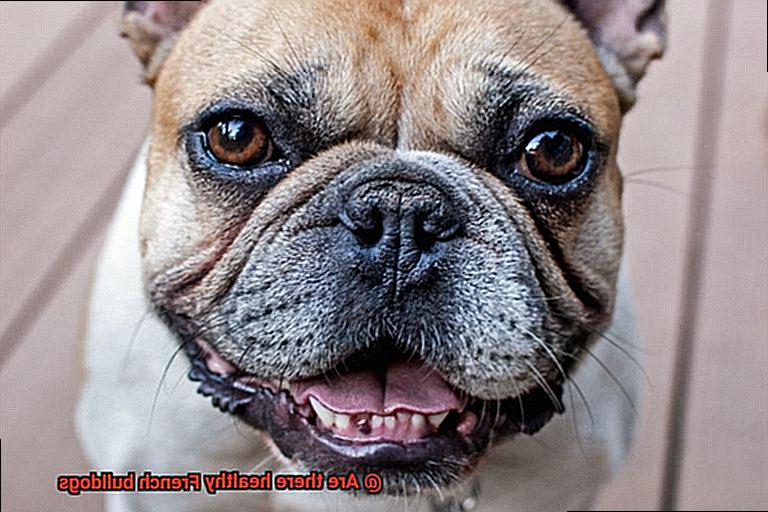Are there healthy French bulldogs?
Looking to add some love and excitement to your life? Well, search no further. We invite you to dive headfirst into the enchanting world of French Bulldogs and discover the countless health benefits they bring into your home. These adorable and lively canines have skyrocketed in popularity among pet lovers, and it’s not hard to understand why.
In this blog post, we’ll delve into the notion that there are indeed healthy French Bulldogs out there. Sure, this breed may have its fair share of health concerns, but let’s not overlook the many positive aspects that come with owning these charismatic dogs.
From their affectionate nature to their seamless adaptability to different lifestyles, French Bulldogs offer a plethora of advantages for their human companions. Whether you’re an adventure-seeking individual longing for a four-legged partner or someone who cherishes lazy Sundays on the couch, these compact and low-maintenance canines have got you covered.
Join us as we debunk misconceptions surrounding the health of French Bulldogs and uncover the sheer joy and vitality they can infuse into your life. Prepare to be amazed by their unique attributes as we unravel the secrets behind keeping your furry friend happy, healthy, and thriving.
So go ahead, grab yourself a cup of coffee, sit back, and allow us to be your guide through the marvelous universe of healthy French Bulldogs. Together, let’s embark on this exhilarating journey and unveil what makes these dogs an extraordinary addition to any family.
The Health Issues of French Bulldogs
Contents
- 1 The Health Issues of French Bulldogs
- 2 Respiratory Issues in French Bulldogs
- 3 Genetic Conditions in French Bulldogs
- 4 Obesity in French Bulldogs
- 4.1 Causes of Obesity in French Bulldogs:
- 4.2 Prevention and Management Tips:
- 4.3 Regular Exercise: Incorporate short walks or play sessions into your Frenchie’s daily routine. Engaging them in mentally stimulating activities, such as puzzle toys, can also help burn calories. Monitor Weight: Keep a close eye on your Frenchie’s weight and body condition. If you notice any signs of obesity, such as difficulty breathing or excessive panting, consult with your vet immediately. Obesity is a serious health concern for French Bulldogs, but with proper care and attention, it can be prevented or managed effectively. By following the tips mentioned above and being mindful of their diet and exercise, you can ensure that your Frenchie stays fit, healthy, and happy. Remember, a little effort now can go a long way in preventing future health complications. So, let’s fight the bulge together and keep our Frenchies in tip-top shape. Skin Conditions in French Bulldogs French Bulldogs are beloved pets known for their distinctive appearance and charming personality. However, they are prone to various skin conditions that can cause discomfort and affect their overall well-being. In this comprehensive guide, we will explore common skin conditions in French Bulldogs and provide tips on how to manage and prevent them. Allergic Dermatitis:
- 4.4 Pyoderma:
- 4.5 Interdigital Cysts:
- 4.6 Fold Dermatitis:
- 4.7 Wrinkle and Coat Care:
- 4.8 Prevention and Management:
- 5 Responsible Breeding Practices for Healthy French Bulldogs
- 6 Proper Care for Healthy French Bulldogs
- 7 Benefits of Owning a Healthy French Bulldog
- 8 Conclusion
French Bulldogs have captured the hearts of many with their adorable appearance and affectionate nature. However, it’s essential to be aware of the potential health issues that this breed may face. In this article, we will explore the common health concerns associated with French Bulldogs and provide practical tips to ensure their overall well-being.
Brachycephalic Syndrome – Breathing Difficulties:
French Bulldogs have a unique facial structure that can lead to respiratory issues. Their shortened skull, narrow nostrils, and elongated soft palate can cause breathing difficulties, especially in hot weather. To help your Frenchie breathe easily, avoid strenuous exercise during peak heat hours and provide a cool and well-ventilated environment.
Obesity – Maintaining a Healthy Weight:
Due to their smaller stature and lower activity levels, French Bulldogs are prone to weight gain. Obesity can lead to various health problems such as joint issues and heart disease. To maintain a healthy weight, ensure your Frenchie gets regular exercise tailored to their needs and feed them a balanced diet according to their age and activity level.
Skin Allergies and Dermatitis – Promoting Skin Health:
French Bulldogs are susceptible to skin allergies caused by environmental factors like pollen or certain food ingredients. Regular grooming, including cleaning skin folds, routine bathing with gentle products, and monitoring for any skin irritations or infections, can help keep their skin healthy.
Eye Problems – Regular Eye Examinations:
French Bulldogs are prone to various eye conditions such as cherry eye, entropion, and cataracts. Regular eye examinations by a veterinarian are crucial for early detection and treatment of these issues, preventing long-term complications or vision loss.
Genetic Disorders – Responsible Breeding Practices:
French Bulldogs have a higher risk of genetic disorders such as hip dysplasia and patellar luxation. Responsible breeding practices can help reduce the prevalence of these conditions. When looking for a French Bulldog, choose a reputable breeder who prioritizes the health and well-being of their dogs.
Respiratory Issues in French Bulldogs
In this article, we’ll dive into the most common respiratory problems that French Bulldogs face and share some tips on how you can prevent and manage them. So let’s get started.

Brachycephalic Airway Syndrome (BAS):
Picture this: your Frenchie is snorting, wheezing, and struggling to catch its breath. These are telltale signs of Brachycephalic Airway Syndrome. Thanks to their short and flattened faces, French Bulldogs often have narrowed nasal passages, elongated soft palates, and small tracheas. To help your pooch breathe easier:
- Keep your Frenchie cool in hot weather and limit strenuous exercise.
- Avoid using tight collars or harnesses that put pressure on the neck.
- Opt for a harness instead of a collar to reduce strain on the airway.
- Consider surgery to correct anatomical abnormalities if recommended by your vet.
Laryngeal Collapse:
This one’s more common in older Frenchies, but it can happen to younger pups too. Laryngeal collapse occurs when the cartilage in the larynx weakens or collapses, causing breathing difficulties. Here’s what you can do:
- Avoid exposure to extreme temperatures.
- Feed your Frenchie smaller meals throughout the day to reduce swallowing difficulties.
- Keep your pup at a healthy weight to minimize strain on the airway.
Allergies:
Just like humans, French Bulldogs can suffer from allergies too. Allergens like pollen, dust mites, mold spores, and certain foods can trigger respiratory issues. Here are some tips to manage allergies:

- Keep your home clean and dust-free.
- Use hypoallergenic bedding and avoid harsh chemicals.
- Work with your vet to identify and eliminate potential allergens from your Frenchie’s diet.
Heatstroke:
French Bulldogs are heat-sensitive due to their shortened muzzles, making them more prone to heatstroke. Avoid this life-threatening condition by:

- Providing access to fresh water at all times.
- Limiting exercise during hot weather.
- Creating a cool and well-ventilated environment for your pup.
Genetic Conditions in French Bulldogs
“Genetic Conditions in French Bulldogs: How to Keep Your Frenchie Healthy”
French Bulldogs are undeniably cute and lovable, but their unique genetic makeup puts them at risk for certain health conditions. As a responsible owner, it’s crucial to be aware of these genetic conditions and take steps to protect your Frenchie’s health. In this blog post, we’ll discuss the most common genetic conditions in French Bulldogs and provide tips on how to keep your furry friend happy and healthy.
- Brachycephalic Syndrome: The adorable flat face and shortened skull that make French Bulldogs so irresistible can unfortunately lead to breathing difficulties. Keep a close eye on your Frenchie’s breathing, especially during exercise or in hot weather. If you notice any signs of distress, such as excessive panting or wheezing, consult your vet immediately.
- Intervertebral Disc Disease (IVDD): This condition affects the discs between the vertebrae of your Frenchie’s spine. To prevent IVDD, avoid activities that put strain on their back, such as jumping from heights or rough play. Providing proper support for their backs, such as using ramps instead of stairs, can also help minimize the risk.
- Eye Problems: French Bulldogs are prone to various eye issues like cataracts, cherry eye, and progressive retinal atrophy (PRA). Regular check-ups with a veterinary ophthalmologist can help detect these conditions early on and prevent further complications.
- Skin Allergies: Many French Bulldogs suffer from skin allergies, which can cause itching, hair loss, and recurrent infections. Work with your vet to identify and avoid allergens, such as specific foods or environmental triggers. Regular grooming and keeping their living environment clean can also help alleviate skin issues.
- Orthopedic Conditions: Hip dysplasia and patellar luxation are common orthopedic conditions in French Bulldogs. Regular exercise, a balanced diet, and maintaining a healthy weight can help reduce the risk of these conditions.
Remember, prevention is key when it comes to genetic conditions in French Bulldogs. Regular veterinary check-ups, a nutritious diet, exercise, and a loving environment are all essential for keeping your Frenchie healthy. By being proactive in their care, you can ensure that your furry friend enjoys a long, happy, and healthy life.
Obesity in French Bulldogs
In this blog post, we’ll delve into the causes of obesity in French Bulldogs and provide you with practical steps to prevent or manage it. So, grab a cup of coffee and let’s get started.
Causes of Obesity in French Bulldogs:
Overfeeding and Improper Diet:
French Bulldogs may be small in size, but they have big appetites. It’s easy for owners to fall into the trap of overfeeding or providing them with an improper diet. Remember, their low activity levels mean they burn fewer calories, making weight gain more likely.
Food-Seeking Behaviors:
French Bulldogs are notorious food lovers, and their cute little faces can be hard to resist. However, giving in to their begging or allowing them to scavenge for food can contribute to obesity. Keep a close eye on their food intake and provide appropriate portion sizes.
Lack of Exercise:
Due to their short snouts and compromised breathing ability, French Bulldogs struggle with vigorous physical activity. However, regular exercise is crucial for maintaining a healthy weight. Short walks or play sessions can make a big difference.
Prevention and Management Tips:
Consult with a Veterinarian:
Seeking guidance from a veterinarian is essential in preventing obesity in French Bulldogs. They can recommend an appropriate diet plan based on your Frenchie’s age, weight, and activity level.
Portion Control:

Measure your Frenchie’s food portions accurately and avoid free-feeding. Using a measuring cup or feeding them at scheduled intervals will help prevent overeating.
Healthy Treats:
We all love spoiling our furry friends with treats, but it’s important to choose healthy options. Opt for low-calorie treats or use small pieces of fruits and vegetables as rewards.
Regular Exercise:
Incorporate short walks or play sessions into your Frenchie’s daily routine. Engaging them in mentally stimulating activities, such as puzzle toys, can also help burn calories.
Monitor Weight:
Keep a close eye on your Frenchie’s weight and body condition. If you notice any signs of obesity, such as difficulty breathing or excessive panting, consult with your vet immediately.
Obesity is a serious health concern for French Bulldogs, but with proper care and attention, it can be prevented or managed effectively. By following the tips mentioned above and being mindful of their diet and exercise, you can ensure that your Frenchie stays fit, healthy, and happy. Remember, a little effort now can go a long way in preventing future health complications. So, let’s fight the bulge together and keep our Frenchies in tip-top shape.
Skin Conditions in French Bulldogs
French Bulldogs are beloved pets known for their distinctive appearance and charming personality. However, they are prone to various skin conditions that can cause discomfort and affect their overall well-being. In this comprehensive guide, we will explore common skin conditions in French Bulldogs and provide tips on how to manage and prevent them.
Allergic Dermatitis:
Allergic dermatitis is a prevalent skin condition in French Bulldogs and is often caused by allergies to certain foods, environmental factors, or flea bites. Symptoms include itching, redness, and inflammation of the skin. To manage allergic dermatitis, it is important to identify and eliminate the allergen from your Frenchie’s environment. This may involve dietary changes, using hypoallergenic bedding, and regular flea prevention.
Pyoderma:
Pyoderma is a bacterial infection that affects the skin and commonly occurs in French Bulldogs. It presents as red, inflamed, and pus-filled lesions on the skin. Underlying factors such as allergies or compromised immune systems can contribute to pyoderma. Treatment typically involves antibiotics prescribed by a veterinarian, along with addressing any underlying issues.
Interdigital Cysts:
French Bulldogs are prone to interdigital cysts, which are painful fluid-filled swellings that occur between the toes. These cysts can result from infections, foreign bodies, or trauma to the area. Treatment may involve draining the cysts and administering antibiotics if necessary. Preventive measures include regular inspection of paws for any signs of swelling or discomfort.
Fold Dermatitis:
Fold dermatitis primarily occurs in facial folds and tail pockets due to the accumulation of moisture, dirt, and bacteria in these areas. Proper hygiene is crucial in managing fold dermatitis. Regular cleaning and drying of folds can help prevent irritation, redness, foul odor, and infection. Using a mild, dog-specific cleanser is recommended.
Wrinkle and Coat Care:
French Bulldogs have short coats and wrinkles that require regular attention. Wrinkles should be cleaned and dried to prevent bacterial or yeast infections. Regular brushing helps remove loose hair and debris, while nail trimming prevents scratches and injuries. Cleaning the ears regularly also prevents infections.
Prevention and Management:
Maintaining proper hygiene practices, such as regular bathing with a mild dog-specific shampoo, is essential for preventing and managing skin conditions in French Bulldogs. However, excessive bathing should be avoided to prevent dryness and irritation. A healthy diet that is free from common allergens can help minimize the risk of allergic dermatitis. Supplements like omega-3 fatty acids can support skin health and reduce inflammation.
Responsible Breeding Practices for Healthy French Bulldogs
If you’re a proud French Bulldog owner or thinking about adding one to your family, it’s crucial to understand the importance of responsible breeding practices. By following these guidelines, breeders can ensure the health and well-being of the breed and produce healthy French Bulldog puppies. Let’s dive in.
Health Screenings:
Before breeding, it’s essential to conduct thorough health screenings on both parents. This includes tests for common genetic conditions like hip dysplasia, patellar luxation, and brachycephalic airway syndrome. Screening for other potential health issues such as heart diseases, eye problems, and allergies is also crucial. By identifying and eliminating these issues from the breeding pool, we can minimize the risk of passing them on to future generations.

Pairing Complementary Traits:
When selecting breeding pairs, it’s important to consider physical characteristics and temperament. This helps reduce the chances of genetic disorders and promotes healthier puppies. For example, if one parent has a particularly short snout, it’s beneficial to choose a mate with a slightly longer snout to improve respiratory function.
Proper Veterinary Care:
Responsible breeders provide their breeding dogs and puppies with proper veterinary care. This includes vaccinations, deworming, and regular check-ups to ensure they are healthy and protected against common illnesses. Additionally, puppies should receive early socialization and a balanced diet to support their growth and development.
Limited Litters:
To prevent overbreeding and ensure each puppy receives enough attention, ethical breeders limit the number of litters they have per year. This allows them to focus on providing the necessary care and attention to each puppy during those critical first weeks of life.
Suitable Homes:
Reputable breeders carefully select suitable homes for their puppies. They ensure potential owners are responsible and capable of providing the necessary care and attention French Bulldogs require. This includes understanding their specific needs, such as regular exercise and a climate-controlled environment.
Ongoing Support:
Responsible breeders go the extra mile by providing health guarantees and ongoing support and guidance throughout the dog’s life. They are available to answer questions, offer advice, and assist with any challenges that may arise.
Proper Care for Healthy French Bulldogs
French Bulldogs are adorable and affectionate companions that bring joy to our lives. As responsible owners, it is our duty to provide them with the proper care they need to lead a healthy and fulfilling life. In this guide, we will explore the essential aspects of caring for your French Bulldog, from their diet and exercise needs to grooming and regular veterinary check-ups.
Diet:
Proper nutrition is fundamental for the overall health and well-being of your French Bulldog. Ensure you feed them high-quality dog food that meets their specific breed, age, and size requirements. Avoid feeding them table scraps or foods that are harmful to dogs, such as chocolate, onions, and grapes. Due to their sensitive stomachs, it is advisable to feed them smaller meals throughout the day rather than one large meal.
Exercise:
While French Bulldogs may not be marathon runners, they still require regular exercise to stay fit and happy. It’s important to remember that they have a short snout, so they are prone to overheating and breathing difficulties. Engage them in moderate activities like short walks, interactive play sessions, and mental stimulation exercises. Avoid strenuous exercise or exposing them to hot weather.
Grooming:
To keep your French Bulldog looking and feeling their best, regular grooming is essential. Their short coats require regular brushing to remove loose hair and prevent matting. Pay special attention to cleaning their facial folds as well, as this area can accumulate dirt and bacteria. Trim their nails regularly and clean their ears to prevent ear infections.
Dental Care:
French Bulldogs are prone to dental issues, so establishing a dental care routine is crucial. Brush their teeth regularly using dog-specific toothbrushes and toothpaste. Provide dental treats or chew toys that help remove plaque and tartar buildup. Regular dental cleanings by a veterinarian are also recommended.
Regular Veterinary Check-ups:
Routine check-ups are vital for monitoring your French Bulldog’s overall health. Vaccinations, parasite prevention, and screenings for common health issues like hip dysplasia, allergies, and respiratory problems should be included. Building a trusted relationship with a veterinarian familiar with the breed’s specific health needs is essential.
Conclusion:
By providing your French Bulldog with proper care, you are ensuring their happiness and longevity. Remember to tailor their diet, exercise routine, grooming habits, and veterinary care to their individual needs. With dedication and love, you can enjoy many years of companionship with your healthy and vibrant French Bulldog.
Benefits of Owning a Healthy French Bulldog
By prioritizing their health, you’ll unlock a whole new level of happiness for both you and your four-legged friend. So, let’s wag our tails and dig into the pawsitive perks awaiting those who care for their French Bulldogs’ well-being.

Reduced Health Issues:
Owning a healthy French Bulldog means fewer worries about common breed-related health concerns. By maintaining their overall health and wellness, you can minimize the risk of respiratory problems, joint issues, and skin allergies. Regular exercise, a balanced diet, and routine vet check-ups are key in ensuring your Frenchie stays in tip-top shape.
Breathing Easy:
French Bulldogs are known for their adorable smushed faces, but this also makes them prone to respiratory difficulties. However, with a healthy lifestyle, including exercise to strengthen their lungs and regular vet visits to monitor any potential issues, your Frenchie can breathe easy and enjoy an active life by your side.
Happy Joints:
Keeping your French Bulldog at a healthy weight and providing appropriate exercise is crucial for their joint health. By doing so, you’re reducing the risk of hip dysplasia and other joint-related problems. So grab that leash and take your Frenchie for daily walks to keep those joints happy and wiggly.
Glowing Skin:
A healthy diet rich in essential nutrients promotes good skin health for your French Bulldog. By providing them with quality food that supports their sensitive skin and maintaining regular grooming practices, you’ll minimize the risk of rashes, itchiness, and allergies. Your Frenchie’s coat will shine like the sun on a summer day.
Emotional Rewards:
A healthy French Bulldog is a happy French Bulldog. They’ll have more energy to play, bond, and explore the world with you. By ensuring their physical well-being, you’re also nurturing their mental stimulation, leading to a stronger bond between you and your furry companion.
Cost-Effective Care:
With fewer health issues, owning a healthy French Bulldog means fewer vet visits and medical treatments. This not only saves you money but also ensures that your Frenchie can live a comfortable and stress-free life. It’s a win-win situation for both your wallet and your beloved pup.
Contributing to the Breed:
By taking responsibility for your French Bulldog’s health, you become an advocate for the breed’s well-being. Setting an example for other owners by prioritizing their health helps reduce genetic health issues and contributes to the long-term sustainability of the breed.
f3XueAlb5Q4″ >
Conclusion
In conclusion, it is possible to find healthy French bulldogs.
While the breed does have certain health issues that are genetically predisposed, responsible breeding practices and proper care can greatly minimize these risks. It is crucial for potential owners to do thorough research, choose reputable breeders, and ensure that their French bulldog receives regular veterinary check-ups and a balanced diet.
Remember, while there may be some challenges along the way, with the right care and attention, there are indeed healthy French bulldogs out there waiting to bring joy into your life.
You may also like:






